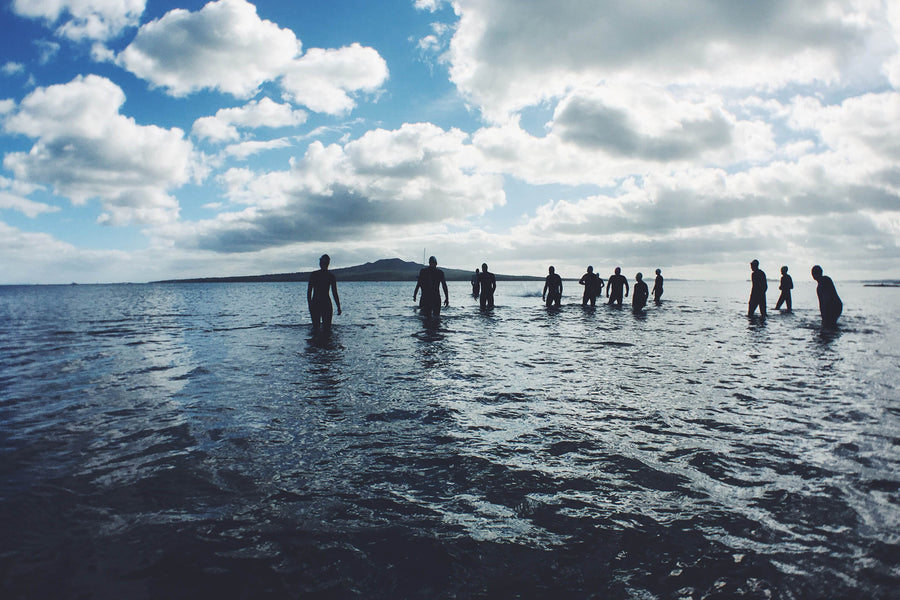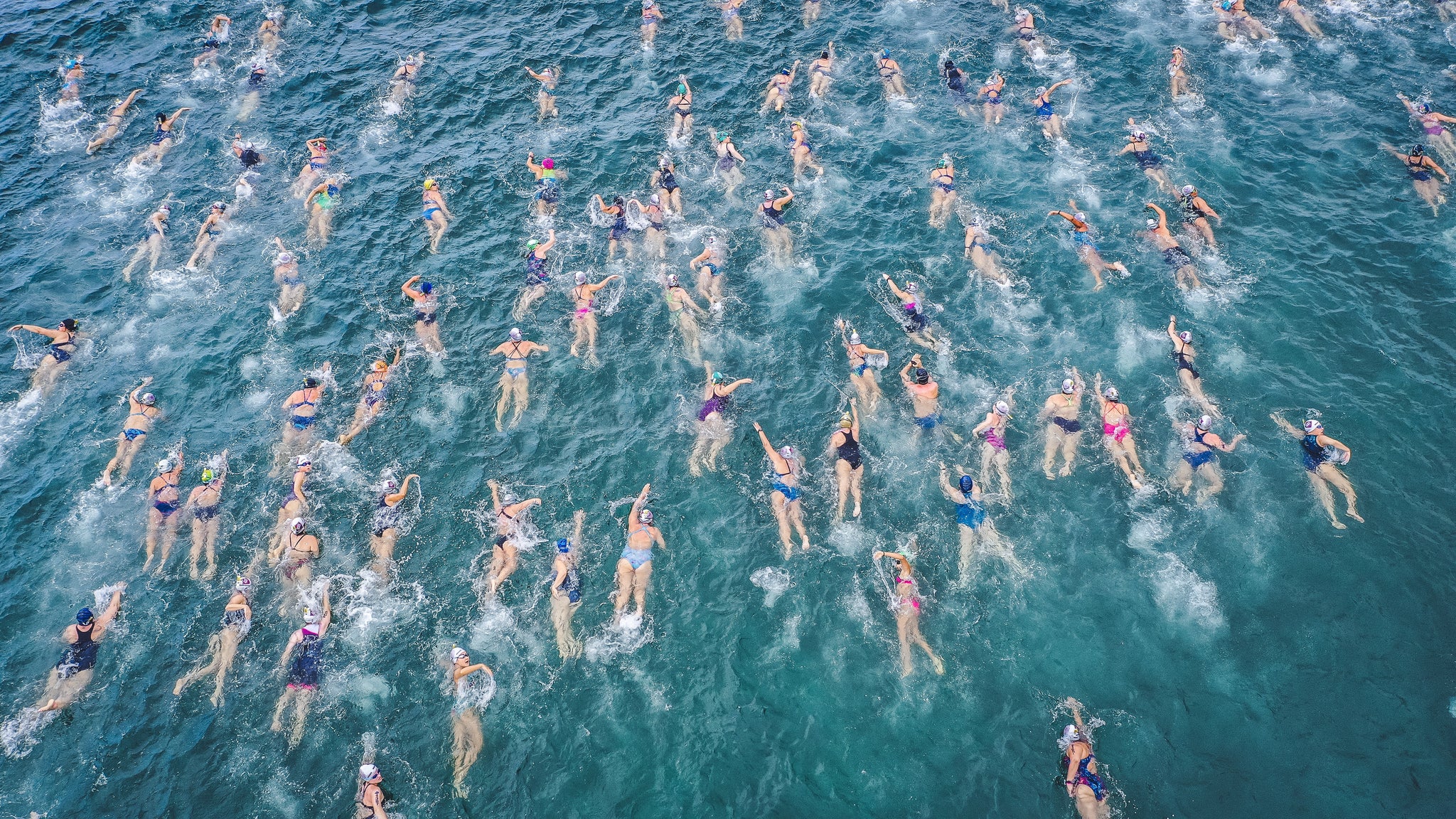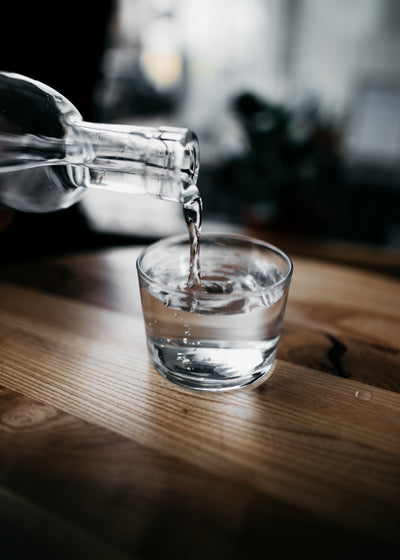THE THRILL OF THE CHILL

How cold-water swimming brings brrrrrilliant health benefits
“Swimming,” writes Roger Deakin in his 1999 book, Waterlog, “is a rite of passage, a crossing of boundaries: the line of the shore, the bank of the river, the edge of the pool, the surface itself. When you enter the water, something like metamorphosis happens. Leaving behind the land, you go through the looking-glass surface and enter a new world, in which survival, not ambition or desire, is the dominant aim.”
Documenting his aquatic adventures across Britain bathing in off the beaten track ponds, rivers, seas and lakes, Deakin's Waterlog is arguably the book that plunged wild swimming into the mainstream. But if this watery tome helped promote swimming in the great outdoors, it has since become a full-blown movement – a way of life – with people’s mounting need to reconnect with nature and their fellow humans, plus a certain Dutch ‘Iceman’ called Wim Hof taking its popularity to new peaks.
A growing community
Hardy Brits are increasingly forgoing heated indoor pools in favour of icy lakes, rivers carpeted with weed and bracing beaches. The National Open Water Coaching Association (NOWCA) said that there had been an 85% increase in outdoor swims this year, compared with 2019. Kate Rew, the author of Wild Swim and founder of The Outdoor Swimming Society, agrees, saying: “I couldn’t control the Outdoor Swimming Society if I wanted to. It keeps growing and growing.”[1]
It’s not just the outdoor element that’s drawing swimmers to the wild, though. It’s the temperature of the waters they find there that compels them to return time after time, with many speaking of the addictive quality of the cold-water hit.

The big chill
But for a few short months, Britain’s waters are decidedly chilly, with the average sea temperature ranging from 15-20°C in summer to 6-12°C in winter. Freshwater bodies can be even colder. Given this less than inviting prospect, what is it that makes people want to take the plunge and embrace cold-water swimming? Kate Rew has a few ideas. She believes that “being indoors used to be a luxury, but now we’re too comfortable – most of our lives are controlled, we’re in manufactured environments a lot of the time. People long to get cold and wet and slightly scared.” Swimming in the wild, Kate explains, is “one of the few things that makes you feel both calm and energised at the same time.” The internet is awash with similarly glowing reports, with open water swimmers seemingly hooked on the transformative feelings of mental clarity, serenity and strength – where the stresses and strains of modern life melt away.[2]
But, aside from the widely reported feel-good factor, what about the scientific benefits? Is there any evidence to prove that cold-water swimming makes you healthier, and if so, how?
Why do it?

It could protect you from dementia
New research[3] by the University of Cambridge has found that swimming in cold water could help protect the brain from degenerative diseases like dementia.
In a world-first, researchers detected significant levels of the so-called “cold-shock protein” known as RBM3 in the blood of seasoned swimmers at London’s Parliament Hill Lido (who regularly push their body temperature to the point of hypothermia).
This is exciting, because, in previous studies on mice,[4] RBM3 – which appears to be triggered when the body is cooled to a hypothermic state – was shown to slow the onset of dementia and even repair some of the synapse damage it causes.
For many people, the off-putting prospect of regularly deep-freezing themselves will outweigh the potential benefits, but this research demonstrates the significant and specific healing power inherent in cold-water swimming – offering a promising new avenue for the treatment of dementia.

It increases your ‘happy hormones’
Cold-water immersion has been shown to actively increase dopamine levels by a whopping 250%. [5]
Often called the ‘happy hormone’, dopamine is a chemical messenger that sends signals between neurons. It plays a starring role in how we experience pleasure and contributes to our sense of satisfaction, achievement and motivation as part of our inbuilt reward system. Low dopamine levels have been linked to disorders like depression and Alzheimer’s.[6]
On a more elemental level, we also know that exposure to natural light – even of the weak wintery variety – increases our levels of serotonin and Vitamin D, both of which contribute to happiness.

It can strengthen your immune system
Dubbed the ‘Iceman’, Wim Hof is a Dutch 61-year-old with an extraordinary ability to withstand freezing temperatures – and reap incredible health rewards. His much-lauded Wim Hof Method is a combination of breathing exercises, meditation and repeated cold exposure, with his website inviting followers to “use the power of cold to burn fat, boost your immune system, sleep better, reduce inflammation and enhance nature's mood boosters.”
In the Wim Hof Method, cold exposure is mainly administered by way of ice baths and cold showers, but the principle is much the same as cold-water swimming, giving the body a cold, sharp shock.
In a 2011 study,[7] Wim Hof proved his unique ability to voluntarily control his body’s autonomic nervous system and immune response. He was injected with an endotoxin and was able to resist its impact by using the same breathing and meditation techniques he employs to endure cold. A second study[8] in 2014 found these results could be reproduced with a larger group. This time, 12 Wim Hof Method practitioners were injected with the same endotoxin, and once again were able to control their sympathetic nervous system and immune response. During their training, the 12 subjects exposed themselves to cold in several ways, including daily swimming in freezing water.
Other research papers have similarly shown a link between cold-water swimming and strengthened immunity. One such study[9] found that, in response to the physical stress caused by regular winter swims, subjects produced significantly more white blood cells (key players in the immune system), amongst other improved immune functions.

It can alleviate anxiety, stress and depression
In 2018, the British Medical Journal published a case study[10] reviewing open water swimming as a treatment for depression. The study monitored a 24-year-old woman with depression and anxiety, whose severe symptoms had been resistant to medication and therapy. Following a weekly programme of cold-water swimming, the woman experienced “an immediate improvement in mood after each swim and a sustained and gradual reduction in symptoms of depression, and consequently a reduction in, and then cessation of, medication.” On follow-up a year later, she remained medication-free – saying it felt “like a weight had been lifted”.
The scientists behind the report attribute this reaction to the way cold-water immersion trains the “fight or flight mode in your body. Initially, dipping into cold water puts your body under stress and produces a shock response. But on repeated exposure to cold water, you diminish this stress response. Having a better rein on your stress response means you’re able to better cope when faced with any stress that life throws at you.”
This reduced stress response is linked with[11] activating the parasympathetic, or ‘rest and digest’ nervous system. The vagus nerve is a key player in this system, connecting your brain to vital organs like the heart, gut and lungs. When your sympathetic nervous system revs up the fight or flight response, flooding your body with cortisol and adrenaline, it’s the vagus nerve that calms everything down by sending instructions for the release of ‘tranquil’ feel-good hormones like oxytocin. The health of the vagus nerve is therefore closely connected to mental wellbeing, with those with a stronger vagus response believed to be better equipped to deal with anxiety.
Anecdotal evidence supports the theory that cold-water immersion could help combat mental health issues, with many swimmers expounding how the cold quiets their thoughts and works better than medication. “I had been diagnosed with depression and anxiety at the age of 17,” says winter swimmer Pete White. “I took a cocktail of medication to be functional. However, cold water swimming […] led to me being able to be drug-free at the age of 33.”

It could help to ease chronic pain
There is a growing interest in scientific circles as to whether cold-water immersion could help relieve the inflammation and pain associated with certain debilitating chronic conditions, like fibromyalgia and rheumatoid arthritis.
The image of weary athletes soaking their sore muscles in ice baths is a familiar one, showing the accepted anti-inflammatory effects of cold therapy. However, one Finnish study found[12] that winter swimming helped people with pain from rheumatism, fibromyalgia, as well as asthma. The researchers reported that “after four months, the swimmers felt themselves to be more energetic, active and brisk”.
It’s a finding that is backed up by anecdotal accounts. Speaking to The Telegraph,[13] dedicated cold-water swimmer Karin MacKinnon, who suffered from fibromyalgia and depression for decades, said that what struck her after her initial dip was that “it was the first time in years I hadn’t felt any pain.” Soon after, Karin “came off the opiates and antidepressants for the first time in 25 years”.
Telling a similar story, Dawn Craig suffered so badly with pain following a back injury that she was unable to leave her bed. By her later thirties, she was “medically retired” from work and suicidal. Like Karin, cold-water swimming has helped Dawn to manage her condition. “That’s my medication now,” she says, explaining how she discovered that the more she swam, the more the pain went away.
Whilst more medical research into cold-water swimming and chronic pain is needed, the potential for future findings and treatment looks promising.
Does taking a cold shower have the same effect?
If your sea dips are limited to the summer holidays, all is not lost. The Iceman himself, Wim Hof, is an advocate of cold showers, meaning you can get your cold fix from the comfort of your own home.
Whilst you do lose the unique joy of being in nature and sharing your experience with others, the science[14] seems to support taking a cold shower as having many similar benefits to swimming in cold water. Both provide that all-important ‘cold shock’, helping to train your fight-or-flight response to stressors.
If you are new to cold exposure (and feeling brave!), try finishing your usual warm shower with 15-30 seconds of cold water, and build up from there.

How to wild swim (safely)
- Swim with others. Search out a group in your area, and enjoy the unique camaraderie of outdoor swimming en masse.
- Wear a wetsuit if you’re not used to the cold.
- Before you get in, know where you’re going to get out again.
- Never jump or dive into cold water. Enter slowly and mindfully.
- Exhale deeply as you enter the water, and concentrate on steadying your breath. Check out the Wim Hof Method for effective breathing techniques and exercises.
- If you’re new to wild swimming, stay close to the shore and stick to the shallows. Opt for beaches with lifeguards for an added layer of safety.
- Wear a brightly coloured hat! Not only will this help you retain heat, but it will make you easy to spot.
- For when you emerge: take cosy, loose layers that are easy to pull on (frozen fingers don’t do well fumbling with buttons), a woolly hat, scarf and gloves, plus a flask of something nice and hot. If you’re going to be swimming regularly you might want to invest in a waterproof, fleece-lined robe like this one.
- Leave no trace. Take all your belongings and any litter with you to keep natural environments clean.
- Finally, cold-water swimming is (quite literally) not for the fainthearted. It can be dangerous and comes with real risks, from cold shock to hypothermia and heart attack.
- Remember – you are responsible for your own safety. Be honest about your abilities and know your limits. Listen to your body and don’t stay in the water for too long.
- Always consult your doctor before getting in the water if you have any pre-existing health conditions or cause for concern.
For more information and advice on safe wild swimming, visit www.outdoorswimmingsociety.com/category/survive
To find an open water swimming group near you, visit: www.outdoorswimmingsociety.com/uk-wild-swimming-groups/
References
[1] https://finisterre.com/blogs/broadcast/in-conversation-with-kate-rew
[2] https://www.independent.co.uk/life-style/women/katie-piper-cold-water-swimming-bluetits-wales-community-love-a8943791.html
[3] https://www.youtube.com/watch?v=n0-OCVPP6EE&ab_channel=SocietyofNeuroscientistsofAfrica
[4] https://www.telegraph.co.uk/news/science/science-news/11346324/How-hibernating-animals-could-help-fight-Alzheimers-disease.html
[5] https://pubmed.ncbi.nlm.nih.gov/10751106/
[6] https://pubmed.ncbi.nlm.nih.gov/27926449/
[7] https://www.sciencedaily.com/releases/2011/04/110422090203.htm
[8] https://www.ncbi.nlm.nih.gov/pmc/articles/PMC4034215/
[9] https://pubmed.ncbi.nlm.nih.gov/22141210/
[10] https://www.ncbi.nlm.nih.gov/pmc/articles/PMC6112379/
[11] https://outdoorswimmer.com/blogs/swim-positive
[12] https://www.telegraph.co.uk/health-fitness/body/brrr-joys-cold-water-swimming/
[13] https://www.telegraph.co.uk/swimming/2020/05/11/wild-swimming-has-changed-lives-four-women-open-water-exercise/
[14] https://www.wimhofmethod.com/benefits-of-cold-showers








































